Iran Bans Certain Words In Domestic Media’s Coverage Of Current Unrest
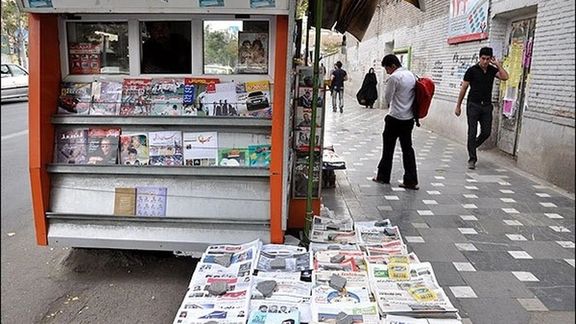
Iran’s Intelligence Ministry has warned domestic media against using several words in their reporting on rising prices and ongoing anti-government protests in the country.

Iran’s Intelligence Ministry has warned domestic media against using several words in their reporting on rising prices and ongoing anti-government protests in the country.
According to information received by Iran International on Saturday, the ministry has prohibited the media from using words such as "economic surgery", "violent confrontation", "clashing with people" and "sit-in", threatening them with judicial penalties.
“Economic surgery” is a term used by many government officials, including first deputy prime minister Mohammad Mokhber, to refer to the elimination of food import subsidies by President Ebrahim Raisi’s administration that has led to a rapid rise in prices and an explosive social situation. The phrase has been used by some critics of the government in political cartoons and articles.
Recently, an audio message was sent to all producers and presenters of Radio Farhang, telling them to avoid reporting economic woes and the government's responsibility and threatening them that mistakes will not be forgiven because these issues are now "viewed as [national] security matters."
Supreme Leader Ali Khamenei who charts the country's macro-policies, including the economy, takes no personal responsibility for the failures and has on several occasions publicly blamed the government of President Ebrahim Raisi's predecessor, Hassan Rouhani, for economic troubles.
Anti-government unrest in Iran triggered by a sudden rise in food prices spread further on Friday, with officials blaming foreign-based Persian-speaking media.
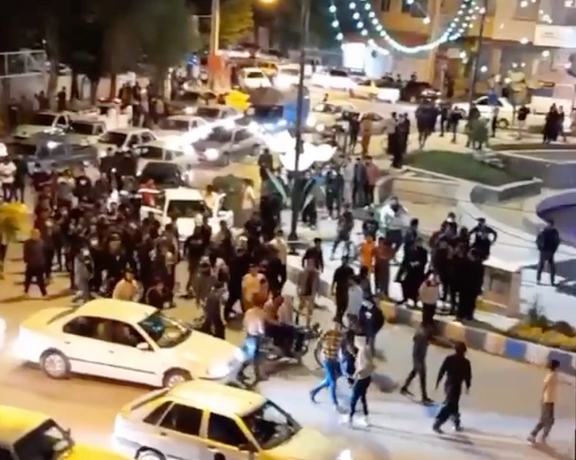
As anti-government protests triggered by rising prices sweep across Iran, state media and officials are in denial, but many observers were expecting the unrest.
In the meantime, two sociologists explained the underlying reasons for the protests in interviews with Iran International Television.
Majid Mohammadi, an exiled sociologist and commentator, told the IITV that "There is a war in Iran between the government and the people over their share of the country's national resources. The government believes that it owns the national wealth while the nation should be kept in poverty. Men in government believe in "resistance economy" for the nation while they live an affluent lifestyle as they continue their expansionist policies abroad."
Mohammadi went on to say that the rulers are actively involved in sending their money and children to other countries while economic pressure and lack of freedoms force some ordinary people to become refugees. On the other hand, others are not willing to leave the country's resources to the government.
He added that during the past 43 years, the government has usurped many of the people's rights and has monopolized the ownership of the media and banned freedom of expression and association. In smaller towns where people have little access to the country's wealth, people are more determined to prevent the government's monopoly on resources.
Mohammadi said that there are three characteristic elements in smaller towns where protests are more intense. The first is poverty, misery and unemployment. The government in its own estimates considers 90 percent of the population "poor". They live in small towns while the other 10 percent live in big cities such as Tehran, Mashhad, Esfahan and Shiraz.
"The second characteristic is that people in small towns have distanced themselves from political Islam. In their slogans during protests in the past four years, there is no trace of political Islam," Mohammadi said, adding that "the third characteristic of small towns is that the people who take to the streets have cut off their ties with the clerics and see them as their enemies. They do not want the Shiite clerics to have any role in the government in Iran."
Mohammadi said that chanting slogans in favor of Reza Shah Pahlavi, the founder of the Pahlavi dynasty, mainly marks the protesters' opposition to the ruling clerics.
Meanwhile, Hossein Ghazian, another Iranian sociologist told Iran International TV that although the protests are taking place in the form of a reaction to rising prices, Iranian society has been expecting such a development. Many had earlier likened Iran to a gunpowder keg. Some even said that Iranian society was sitting on a gasoline tank short of a spark to ignite it. "However, I like to say that we have many social and political fault lines that might lead to a small or a bigger jolt at any moment, as saw in nationwide protests in 2017, 2018 and 2019," Ghazian said.
The sociologist added that the dynamics of these jolts are affected by a few factors: First, it is important how widespread they are and how many locations they affect. The second factor is for how long every jolt lasts. The third factor is the magnitude or the number of individuals who join the protests. The nature of demands is also important – whether protesters for example have sectoral demands or ask for wholesale change.
Ghazian said, it is still too early to pass judgement on the current protests and to determine in which direction they might move. He further said that all the major protests since 2017 have been reactions to government actions. No one or group from abroad or from within the country has called for protests.
However, Ghazian noted that "There is accumulated dissatisfaction in society that gives way to anger. This anger might occur in various places and at various times without necessarily targeting the true cause of the anger."
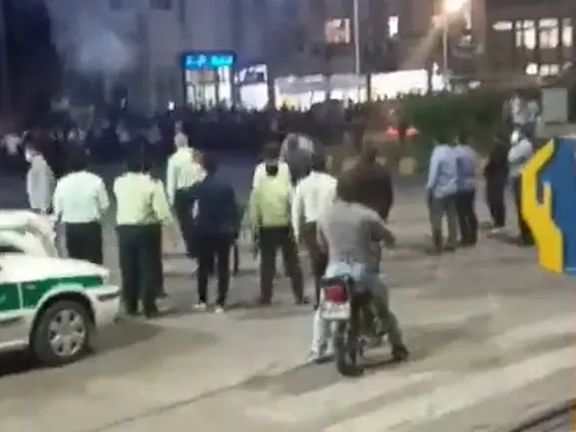
Anti-government unrest in Iran triggered by a sudden rise in food prices spread further on Friday, with officials blaming foreign-based Persian-speaking media.
Protests that began in some cities in southwestern oil-rich Khuzestan Province over a week ago have now spread to many other provinces. Friday evening, protesters took to the streets in many large and small cities including Rasht (capital of the northern province of Gilan), Ardabil (capital of northwestern province of the same name), Iranshahr (in southeastern province of Sistan and Baluchestan) as well as Boroujerd (in western province of Lorestan(.
Calling the Raisi administration "agile", the secretary of Iran's Supreme National Security Council, Ali Shamkhani, said " in a tweet Friday that it will overcome all obstacles through reforming the country's "[economic] structures, optimization of resources, and people's cooperation" and accused foreign-based Persian-speaking media and those following them in Iran of being hostile and exploiting the situation for propaganda against the regime.
"The enemy wants to defeat us through satellite TV [channels], the Internet, rumors, and calls to rally and protest but is impeded by the [IRGC's] Basij militia," Commander of the Revolutionary Guards (IRGC) Hossein Salami also said on Thursday.
Members of the militia are often used to suppress anti-government protests.
The state-appointed Friday prayer imam of Khorramabad, capital of the western province of Lorestan where considerable protests took place on Thursday and Friday, also accused the BBC's Persian channel, Iran International TV, and the Persian channel of Voice of America of trying to exploit these protests.
Videos of protests are rather few as the government has slowed down or completely shut off Internet access in areas where protests have been taking place to prevent videos to be uploaded to social media.
Protesters have been chanting slogans against clerics including Supreme Leader Ali Khamenei and President Ebrahim Raisi amid heavy presence of security forces and riot police. In some of the scant footage available on social media the sound of gunfire is heard in several cities including Izeh and Andimeshk in Khuzestan, Shahr-e Kord, the capital of the western province of Chahar Mahal and Bakhtiari, and Boroujerd in the western province of Lorestan.
‘1500 Tasvir’, an opposition Twitter account, has claimed that security forces shot Omid Soltani, a 21-year-old protester, on Thursday evening in Andimeshk in Khuzestan Province.
Many people have been rushing to supermarkets after the sudden rise in flour, chicken, oil, dairy and eggs to buy food supplies including pasta, a staple for most Iranian families that cannot afford rice, only to find empty shelves. The official news agency (IRNA) on Friday claimed that protesters had looted supermarkets in some cities.
In the meantime, Iran’s battered currency dropped further on Friday, reaching 307,000 rials to one US dollar. Just two months ago the rial stood at 260,000, up from 33,000 in 2017.
Iran’s already weak economy was shaken by former US President Donald Trump’s decision in 2018 to withdraw from the Obama-era nuclear deal with Tehran known as JCPOA, and impose tough sanctions, including a ban on crude oil exports.
Tehran and Washington started negotiations after President Joe Biden took office last year, but so far the effort has not succeeded in reviving the JCPOA.
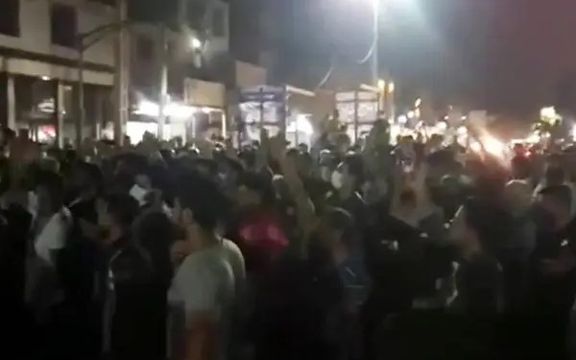
Weeklong protests in Iran triggered by soaring prices spread to several provinces Thursday as they took on anti-regime tones, and tens of people were arrested.
Confirming that protests had taken place in several other cities outside the oil-rich Khuzestan where unrest had alreay begun last week, the official news agency IRNA reported Friday that tens of protesters had been arrested.
Most Iranian media did not report the protests at all but IRNA in its report downplayed the extent of the protests and said they have ended and "calm was established" in all areas where there was unrest.
Early reports and some video evidence show security forces used force in some instances against peaceful protesters marching in the streets and chanting against rising prices and government leaders.
Chants by protesters show that their anger goes beyond higher prices and the unrest has turned into a manifestation of anti-regime sentiments.
In cities where protests took place on Thursday, as videos show, protesters chanted "Death to Khamenei" and "Shame on You Raisi, Leave the Country Alone" and against the government's move to raise prices of food staples including bread, chicken, oil, eggs, and dairy products.In some areas protesters also chanted praises for Reza Shah, the founder of the Pahlavi Dynasty, who began modernization in Iran almost a century ago.
President Ebrahim Raisi announced Monday that his government has begun the process of removing import subsidies for basic foods, animal feed, and medicine. He also confirmed that his government would pay cash assistance to most Iranians as compensation.
The measure has already resulted in soaring bread prices, and economic chaos in the markets.
Many Iranians believe that the effect of cash handouts will soon be offset by more inflation and even higher costs of living.
Raisi on Friday visited a municipality-run food market in the south of the capital to personally check the prices of chicken and other staples and speak to people. A video posted on Twitter shows him saying he will never allow people to be harmed as long as he lives, in response to one of the shoppers questioning him.
Protests outside Khuzestan, where people took to the streets over a week ago, were reported in cities of Lorestan, Chahar Mahal and Bakhtiari, Kohgiluyeh and Boyer-Ahmad and Kermanshah in western Iran as well as Fashafuyeh to the south of the capital Tehran.
According to social media reports security used tear gas in Izeh (Khuzestan), Kermanshah (capital of province of the same name), Shahr-e Kord (capital of Chahar Mahal and Bakhtiari) and fired air shots to disperse the protesters.
Protesters in Jouneghan in Chahar Mahal and Bakhtiari Province attacked the local Basij militia's headquarters and set fire to it. In a video circulating on social media that shows the burning establishment and a vehicle burning inside, the narrator chants "Death to the Dictator" and tells the clerics in power that this is only the beginning, and they will all be killed.
IRNA claimed protesters in Izeh (Khuzestan), where it said only tens had been protesting, attacked some chain stores and torched a mosque and in Andimeshk (Khuzestan), where it said around 200 were protesting threw stones at security forces and firefighters. According to IRNA in Fashafuyeh (Tehran) "tens" of protesters chanted against price hikes.
An attack on a chain store, IRNA said, prompted the interference of security forces who dispersed the protesters. IRNA also reported the arrest of 15 in Dezful (Khuzestan) and seven in Yasuj (capital of Kohgiluyeh and Boyer-Ahmad Province).
Available videos show the number of protesters were much higher than what IRNA claimed and its report about attacks on stores cannot be verified.
Pundits in Iran predicted the unrest in the past one week as prices suddenly jumped. Some have said that if nationwide protests start, they will be much more intense than in November 2019 when security forces were ordered to fire on protesters killing at least 1,500 people.
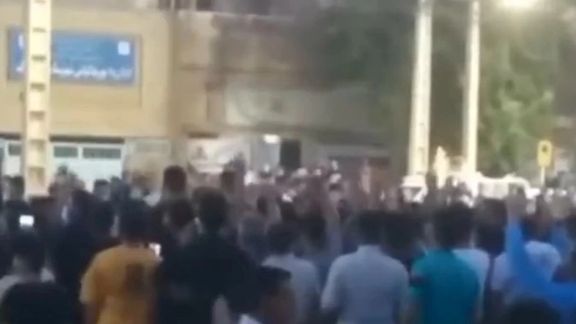
Protests triggered by rising food prices in Iran spread to several regions and cities Thursday evening, as people chanted anti-government slogans and lit fires.
Since last week when the government stopped a key import subsidy, effectively raising bread and other food prices, protests have been taking place in the southwestern oil-rich Khuzestan province. But Thursday, the unrest spread elsewhere in mostly western Iran.
Early reports and some video evidence shows security forces used force in some instances against peaceful protesters marching in the streets and chanting against rising prices and government leaders. In some instances sound of firing tear gas and weapons is heard in videos shared by citizens.
Protesters in Shahre-Kord shouted slogans against President Ebrahim Raisi and voiced solidarity with the people of Khuzestan. They also chanted praises for Reza Shah, the founder of the Pahlavi Dynasty and the leader who began modernization in Iran almost a century ago.
Reza Shah’s grandson, exiled Prince Reza Pahlavi has issued a statement supporting the protesters.
In Andimeshk, Dorood, Izeh and elsewhere protesters shouted slogans against the Supreme Leader Ali Khamenei and other senior officials.
Pundits in Iran predicted the unrest in the past one week as prices suddenly jumped. Some have said that if nationwide protests start, they will be much more intense than in November 2019 when security forces were ordered to fire on protesters killing at least 1,500 people.
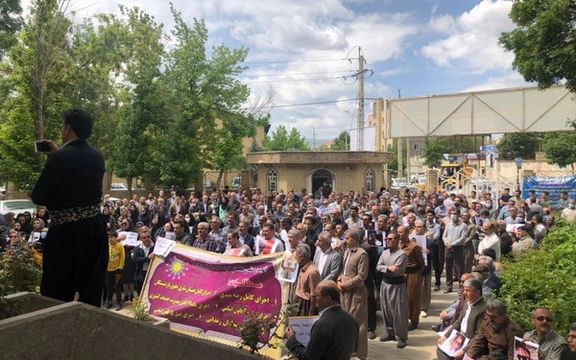
As teachers protested across Iran amid government allegations of foreign influence in their campaign, France Thursday condemned the arrest of two French citizens.
France’s Ministry for Europe and Foreign Affairs told Iran International in a communiqué Thursday it had summoned the Iranian charge d'affaires in Paris after Iran detained two French nationals on charges that they fomented teachers’ demonstrations. The ministry said the ambassador in Tehran had requested consular access to the detainees.
The Iranian Intelligence Ministry claimed Wednesday that the two had met with members of the Coordination Council of Iranian Teachers’ Trade Associations, which has organized nation-wide teachers’ protests since last year. Iran International Wednesday named those arrested as Cécile Kohler, head of the biggest federation of French teachers' unions, and her husband.
The couple arrived in Tehran's Imam Khomeini Airport April 29, stayed in Tehran for two days, and then went to Kashan and Esfahan. They were due to return home May 8, the day of their arrest. An intelligence ministry statement said Wednesday that the two went to Iranwith the aim of changing “popular” demand into “chaos, social disorder and destabilization of society.”
On Thursday, Iranian teachers took to streets for the third time in under two months despite the education ministry’s threat to fire them. According to videos posted to social media, teachers demanded better working conditions and the release of colleagues arrested in previous protests.
‘Reckless and cowardly’
The Coordination Council of Iranian Teachers’ Trade Associations said later in the day said that several people had been arrested after security forces used force to disperse the protesters in some cities, including Ahvaz, Khuzestan province, which Wednesday saw protests over increased food prices.
In a resolution published at the end of the Thursday’s rallies, protesting teachers condemned a "reckless and cowardly” attempt to attribute “decades” of their protests to foreign hands. In Tehran, police cordoned off streets leading to parliament, where teachers had gathered in previous protests.
The protests and the arrest of French nationals occurred as Enrique Mora, the senior European Union official chairing talks to revive the 2015 Iran nuclear deal (the JCPOA, Joint Comprehensive Plan of Action), was in Tehran in an effort to restart the stalled negotiations. Republican Senator James Risch, a JCPOA opponent, said Wednesday that Iran’s detention of European nationals while Mora was in Tehran “should be the final nail in the coffin for any bad deal with Iran”.